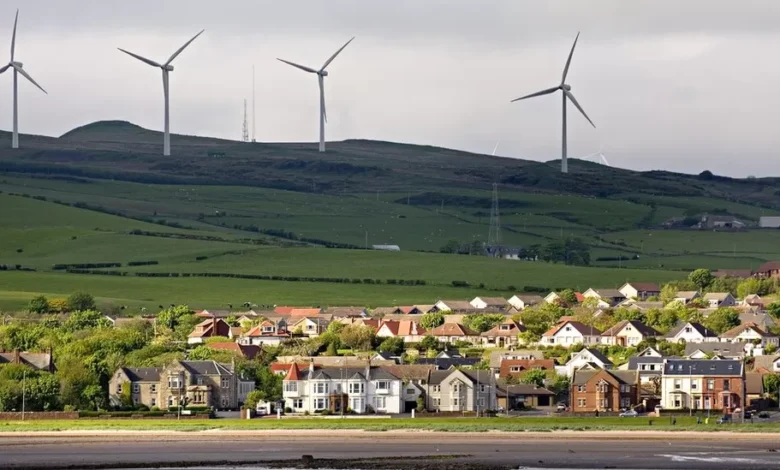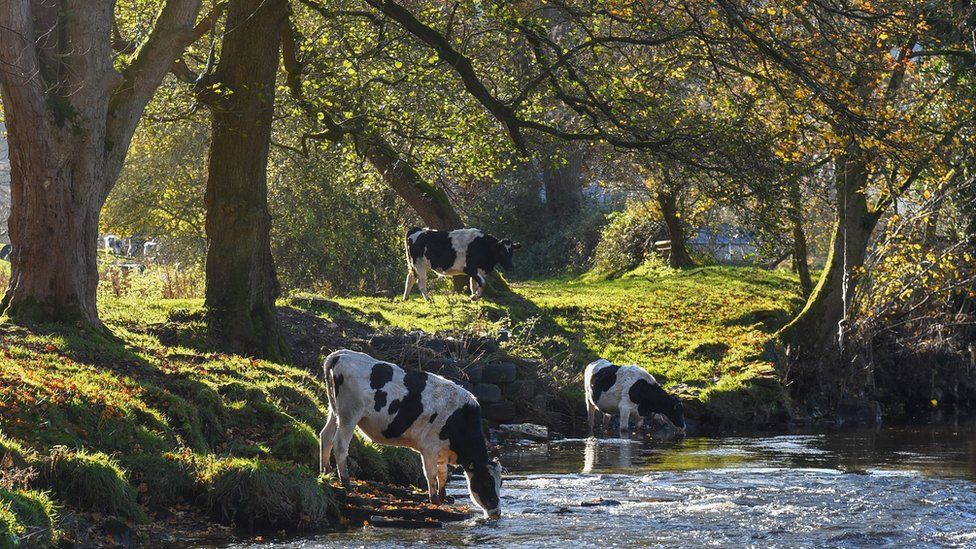Land use: Government has overpromised says Royal Society

The UK government risks “overpromising” finite land with its multiple ambitions on farming, nature and renewable energy, according to a report from scientific academy The Royal Society.
It says an area the size of Northern Ireland could be needed to accommodate current policy targets by 2030.
Farming and forestry groups have welcomed the report and say it shows the need for a UK land-use framework.
A government spokesperson said it would publish its framework later this year.
The report, from the UK National Academy of Sciences, concludes that current policies on land use are “disjointed” and there needs to be more innovative approaches to get the most out of our land.
“The UK does not have enough land for any of it to be non-productive,” said the report’s steering group chairman, Sir Charles Godfray, who is director of Oxford University’s Oxford Martin School.
“But when we say productive, we don’t just mean producing food but producing public good, as well.”
The government has ambitious plans for the UK’s land, from increasing biodiversity to providing more homes. It aims to:
- increase woodland cover from the current 13.2% to 17% by 2050
- scale up crops for energy to 23,000 hectares a year by the mid-2020s
- conserve 30% of land for nature by 2030
- build 300,000 new homes a year in England, by the mid-2020s.
The academy reviewed these pledges and concluded that an additional 4.4 million hectares of land – twice the size of Wales – would be needed by 2050 to achieve them.
But it has put forward five recommendations for reducing this land demand while still meeting the UK’s targets on nature, food and climate change.
One of these recommendations is the establishment of land-use frameworks for each of the UK’s nations to make clear to landowners what the priorities are for its land.
The Lords Urban Use Committee recommended at the end of last year that the government establish a land-use framework for England to provide clarity for farmers, landowners and land managers to make the most effective use of their land.
Emily Norton, head of rural research at Savills, said: “Every time the government sets a new environment target, the question is, where is that going to come from.
“There is going to be a lot of tensions and trade-offs, which is a reason why people keep asking for a land-use framework.”
In the UK around 72% of land is already used for agriculture but the Climate Change Committee – the government’s independent climate adviser – concluded in 2020 that up to 16% of UK land would need to be released from agriculture to support efforts on climate change.
In 2020, agriculture accounted for 11% of greenhouse gases and is one of the main issues associated with freshwater pollution.
Last week, the government announced the long-awaited details of England’s payment scheme for landowners and farmers to reward them for environmental work and more sustainable farming practices.
But Tom Bradshaw, deputy president of the National Farmers’ Union of England and Wales (NFU), said its members were still struggling to understand where they should focus their efforts.
Mr Bradshaw told the BBC: “Members have always followed government policy and we believe we can deliver environment targets, but right now we don’t know what the government’s priority is.”
A spokesperson for the Department of Environment, Food and Rural Affairs said: “Our land-use framework, due to be published later this year, will help farmers adapt to a changing climate. More information will be available in due course.”
The Royal Society has said that better data on the different benefits of land – not just its immediate financial return, but also its social, environmental and health benefits – could help with this.
The report identifies many examples of where land can have multiple uses – including agroforestry, which combines tree planting with farming. Planting trees can protect crops and livestock from the weather and improve the soil structure, potentially increasing crop yield.

The society praised the progress of the Office for National Statistics in building up knowledge of the UK’s land, and said this needed to be built on to improve data on soil quality, climate and ecology and the social sciences, to make “robust land-use decisions”.
Forest Stewardship Council, a non-governmental organisation promoting responsible management of forests, welcomed the report’s focus on the wider benefits of land and also the emphasis on “upskilling”.
Tallulah Chapman, FSC communications manager, told the BBC: “There is a forestry skills crisis and there are currently not enough skilled professionals to support the expansion and complexity of the issue.”
Judy Ling Wong, honorary president of the Black Environment Network, and member of the steering group for this report, said the government had made commitments to deliver green jobs, but “schoolchildren cannot even name the jobs of the land-based sector”.
“This is a critical missing element where we need to move very fast.”










